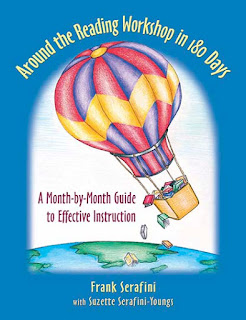By the End of September - Best of Frank Serafini
In my book, Around the Reading Workshop in 180 Days, I included a section at the end of each chapter describing what I hoped to have set in place by the end of each month. In this installment of my blog I offer the description of what I hope to have in place by the end of September. I hope this helps new teachers get a sense of what is important to start the year.
By the end of September, I hope to begin to see, hear, and have established the following things:
- Most students are choosing appropriate reading materials, based on their comprehension abilities, for independent and paired reading – I am aware that I will need to consistently monitor some readers’ choices, but many of my students will be choosing appropriate materials by the end of the month.
- Students are willing to offer ideas when I am finished reading aloud a picture or chapter book without being asked – I want students to know that it is their responsibility to generate and articulate their interpretations without being asked after every reading what they think.
- The classroom library is organized and being used regularly by all students – we spend a great deal of time on the classroom library in September and I expect students to know what is available and how to find it, check it out and return it to its appropriate place.
- Students are writing most every evening in their literature response logs – one of the primary assessment instruments I use is the literature response log. Although these lit logs will include longer and more sophisticated responses as the year progresses, it is essential that students accept the responsibility for completing these every night.
- Students know the basic procedures of the reading workshop and are in the right place, with the right materials, for instruction to begin.
- Students sing along with me during our “shared singing” time – I begin the year playing the guitar and singing songs with my students. I try to choose songs they like, but the expectation is that everyone participates.
- My student assessment forms and notebooks are organized and I have begun to include various assessments in there – September is a time to get to know my students, and for them to get to know me. It is important for me to set up my assessment files so I have a place to keep students’ work samples and assessment forms organized.
- Students are beginning to understand the concept of genre, and use terms like science fiction, mystery, realistic fiction, and fairy tales to describe the books they are reading.
- Students are beginning to listen to each other in group discussions – the concept of “thinking-talking” is based on one’s ability to articulate one’s ideas AND one’s ability to listen to other students’ ideas.
- The classroom will be noisy, but not unruly; engaging but not intimidating; challenging but thoroughly enjoyable – above all, the reading workshop is a place for people to read and revel in the joys and wonders of reading and literature. I need to create a space where every student, regardless of their reading experiences and abilities can find enjoyment engaging in the act of reading.


Comments
Post a Comment